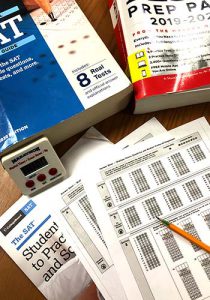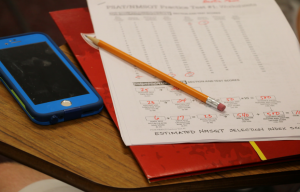Summer Programs for High School Students
 What are you planning to do this summer? Consider something meaningful.
What are you planning to do this summer? Consider something meaningful.
Colleges, universities and scholarship programs are no longer interested in applicants who spend their summers “just hanging out, drinking Mountain Dew and eating Cheetos!!” Every college application you fill out will have a section for summer activities and work experiences. These activities can be the tie-breaker when two applicants are similar in all other areas.
Summer Job?
There are many things that you can do to help you grow as a person and make you an interesting college applicant. Consider finding a part-time summer job. It is even better if it relates to an interest of yours. Even it does not pay well (or at all) you’ll have some hands-on experience that you can promote on a college application. Consider volunteering in your community or becoming a camp counselor.
College Summer Programs
Many colleges offer summer college programs for high school students. They are often hands-on fun rather than serious academics. In either case, you will stimulate your mind, make new friends and may gain a slight edge in the college admissions process. If possible, pick a program at a college you wish to attend. You’ll have an opportunity to scope out the school and meet (and impress) the faculty and staff.
Here is a video from Columbia University that will give you a general feel for college summer programs:
http://youtu.be/5YUDjkWr2rY
Below is a description of summer programs at well-known schools.
University of Texas at Austin: The McCombs School of Business offers current high school students the opportunity to discover business through hands-on experiences, team projects and interactions with McCombs students, faculty, staff and corporate representatives. The program is a free, six-day experience. All expenses (including housing and food) are paid for, with the exception of travel to and from the college. To learn more, visit http://mccombs.utexas.edu/BBA/prospective/high-school-summer-programs.
Texas A&M University (College Station, Texas): The Electrical and Computer Engineering (ECE) Unplugged Summer Camp is a five-day camp designed to give high school students the opportunity to explore electrical and computer engineering as a career. Held in July, the camp is open to all high school juniors and seniors. Underrepresented groups are particularly encouraged to apply. To learn more visit, http://ece.tamu.edu/undergrad/ECEuplugged.htm.
University of Texas at Arlington: The RoPro College Challenge Camp is a three-day camp for high school juniors, seniors and new graduates who want to work with robots and learn about college at the same time. The program will not only provide students with a fun robot challenge and end-of-camp competition, it will also cover topics like college financial aid, choosing a university, entrance essays and how to apply to colleges. To learn more, visit http://cse.uta.edu/robots/summerchallenge.asp.
University of Southern California (Los Angeles): The “Spend Your Summer at USC” program is a four-week residential program allowing students the chance to experience college life and earn three units of university elective credits. Students can choose from courses such as “Film Study,” “Electric Guitar: Jazz, Rock & Beyond” and “Introduction to Video Game Design.” To learn more, visit www.usc.edu/summer.
Pratt Institute (New York City): Every summer, Pratt sponsors a college-level program for high school sophomores, juniors and seniors at its Brooklyn and Manhattan campuses. Students are immersed in a program of art, design, architecture, creative writing, critical & visual studies, or construction management, modeled after Pratt’s undergraduate offerings. Upon completion of the program, students earn four elective college credits. To learn more, visit http://pratt.edu/prostudies.
Cornell University (Ithaca, New York): “Summer College Programs for High School Students” offers three and six-week academic programs for talented sophomores, juniors, and seniors from around the world. You can choose from programs in: Architecture, Art and Design, Business, College Success, Engineering, Environmental Studies, History and Politics, Hotel Management, Humanities, Law and Government, Medicine, Psychology, Research and Science, and Veterinary Medicine and Animal Science. To learn more, visit http://summercollege.cornell.edu.
Harvard University (Cambridge, Mass.): Through the Harvard Secondary School Program, high school students can take real Harvard courses. Participants study alongside college and adult students alike and learn what Harvard is really like. Students can explore subjects that are not available at their high schools and earn college credit. To learn more, visit http://ssp.harvard.edu.
Stanford University (Palo Alto, Calif.): The High School Summer College is for high school students ages 16 and 17. All program participants build their own schedule of challenging college-level courses that will be documented on an official Stanford University transcript. To learn more, visit http://summer.stanford.edu/programs.
Massachusetts Institute of Technology (Cambridge, Mass.): MIT offers two six-week programs for high school juniors. The Minority Introduction to Engineering and Sciences (MITES) is for students who intend to pursue careers in science, engineering and entrepreneurship, especially those from underrepresented groups. The Research Science Institute (RSI) stresses advanced theory and research in mathematics, the sciences and engineering. Participants attend classes and complete hands-on research, which they often use to enter science competitions. Both programs are free to students who are selected with the exception of transportation costs. To learn more, visit http://mitadmissions.org/apply/prepare/summer.
Naval Academy Summer Seminar: A six-day program for students who have completed their junior year in high school. Participants will attend eight workshops centering on the various majors offered at the academy. To learn more visit: http://www.usna.edu/Admissions/nass.htm Other services offer summer programs including the Air Force, Army and Coast Guard.
If none of these summer programs interest you, do a search on the internet for ‘high school summer programs’ to find one that does.
Robin Farris is a College Admissions Adviser at the Marine Military Academy in Harlingen, TX. MMA is an all Boys private college preparatory boarding school. For more information about MMA visit our website: http://www.mma-tx.org



